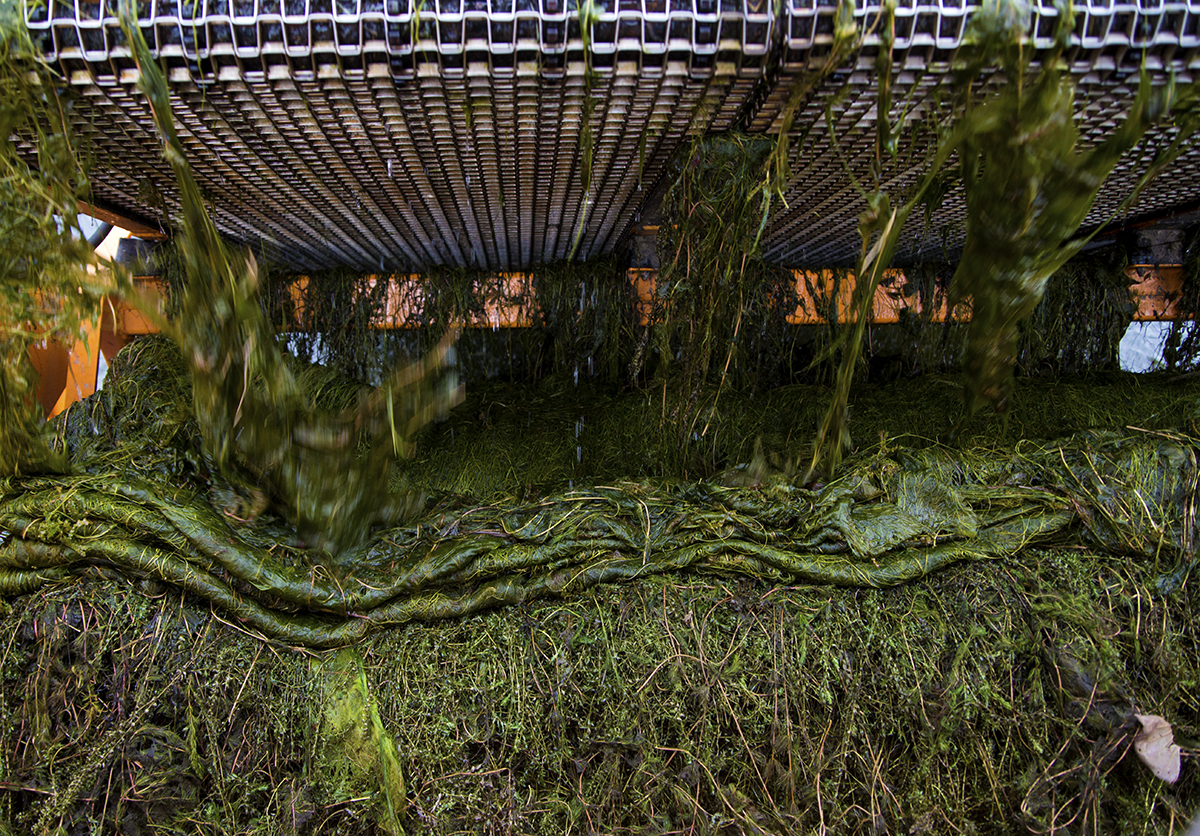The question of whether to use herbicides still lingers over Chautauqua Lake nearly two months after chemicals were used to test killing invasive vegetation.
“Herbicides can be a good thing or a bad thing depending on what chemicals are used,” said John Jablonski, executive director of the Chautauqua Watershed Conservancy. “You can really throw the balance off if you use too many.”
Two kinds of herbicides — chemicals used to kill off unwanted plants — were applied at three locations in Bemus Bay on June 26 with supervision from the New York Department of Environmental Conservation for a “data collection project,” according to the DEC. A local group, the Chautauqua Lake Partnership, had requested the application earlier that month due to concerns from homeowners regarding excess weeds.
That action concerned a number of other organizations, members of which spoke out against herbicides at last month’s Chautauqua County Legislature meeting on July 26. Among them was Director of Operations John Shedd, who spoke on behalf of Chautauqua Institution and expressed concern over herbicides’ impact on Chautauqua’s drinking water, which is sourced from the lake.
Now, as excess vegetation persists on the lake in the last months of summer, residents are considering how to move forward, with some concerned about the unknowns associated with the herbicides’ environmental effects.
“I’m concerned that there are many unknowns,” said biologist Rebecca Nystrom. “Very few studies have been done on long-term impacts, and no studies have been done, to my knowledge, on impacts when you combine these two herbicides.”
Others in favor of herbicides, though, argue the chemicals can be a beneficial part of the lake’s future. The Chautauqua Lake Partnership, for example, plans to expand their efforts to implement herbicide application next year.
“It was a strong start,” said Jim Cirbus, CLP president. “The status quo is not going to be the status quo anymore.”
Herbicides and weeds
The herbicide application in June used two varieties, called Aquathol-K and Navigate, as part of a project to evaluate the chemicals’ effectiveness on invasive vegetation. The project will also determine whether native vegetation was impacted and if herbicides drifted outside of the three zones, said DEC spokesperson Megan Gollwitzer.
Further herbicide use in the lake will require additional DEC review and new permits, she said.
Before June, the last time herbicides were used in the lake was 2002.
Why are the weeds a problem? Invasive species of aquatic plants, such as Eurasian milfoil, can be a nuisance for those who use the lake by limiting mobility around docks and wrapping around boat motors and propellers, according to a previous Chautauquan Daily story.
The weeds are primarily controlled with harvesting operations done by the Chautauqua Lake Association, which uses boats to collect excess plants throughout the lake. As of Aug. 11, the group has removed about 10.1 million pounds of weeds from the lake this summer, CLA Executive Director Doug Conroe said.
At the county legislature meeting, the body also added an amendment to a resolution funding $100,000 for lake vegetation management that clarified the money “shall not be used for the application of herbicides,” according to the meeting’s minutes. The money, which comes from the county’s occupancy tax reserve, will go to groups within the Chautauqua Lake and Watershed Management Alliance and is contingent on conditions in the lake, County Executive Vince Horrigan said.
“(The money) was never intended to be used for herbicides, but there were a number of people that spoke out against the herbicide application,” Horrigan said. “I think there was a misunderstanding that people thought that’s what it’s for.”
Differing stances
Shedd voiced concern at the meeting that the DEC and the “highly experienced” scientists who have spent years researching the lake are not in agreement over whether herbicides are safe to use, according to his prepared remarks.
Among those scientists was Nystrom, who taught for 33 years as a biology professor at Jamestown Community College, is a member of the alliance’s Science Advisory Committee and serves on the board of the Chautauqua Watershed Conservancy. The herbicides, she said, pose health risks to people and organisms living in the lake.
“The current thinking is that if you’ve got a problem, just throw some poisons at it,” Nystrom said. “Herbicide use is problematic because we’re not looking at the possible ecological and health consequences and the future.”
Killing invasive weeds with herbicides may also cause increased algal blooms as the plants decompose and release nutrients back into the water, and may be counterproductive in the long run, she said. One study published in March titled “Lessons from a Decade of Lake Management” found that herbicide use is unpredictable and can harm native plants in some instances.
“It is not Chautauqua Institution’s intent to argue the merits of either perspective,” Shedd said at the meeting, according to its minutes. “It is our role, however, to stay informed about actions taken that could impact the lake, which is our community’s primary water source. Our drinking water.”
The DEC maintains its position that the herbicide application test was safe.
“These herbicides have been safely used throughout New York state for many years,” Gollwitzer said.
Shedd also said the DEC didn’t require the normal public comment period before approving the herbicide permits and called for the agency to create a forum where local groups can discuss their differing opinions on the matter.
“DEC has met and spoken with individuals and groups who both support and oppose the herbicide applications,” Gollwitzer said. “DEC is open to further dialogue with stakeholders on this matters.”
One stakeholder, the Chautauqua Watershed Conservancy, is still of the mindset that herbicides shouldn’t have been used. Jablonski said the chemicals can throw off the balance of nutrients in the lake and harm the ecosystem.
What’s more, herbicides work better on new outbreaks of plants, he said, but the invasive species of plants have been there since the ’40s and ’50s.
“It’s ubiquitous throughout the system,” Jablonski said. “You can’t eradicate it.”
Despite such concerns, Cirbus is confident the herbicide application is benefiting the lake. The area around Bemus Bay has been clear of weeds this summer, he said.
“We haven’t seen any adverse effects from the trial,” Cirbus said. “Data is being analyzed by professionals.”
Plans for the future
In an email to Chautauqua property owners last month, President Michael E. Hill said the Institution will remain in contact with the DEC and county and state officials regarding the impact of herbicides.
“We will continue to keep you informed as we learn new information and continue our education and advocacy efforts,” Hill wrote.
In addition, the Chautauqua Lake and Watershed Management Alliance is looking to work with an independent facilitator with experience in lake management, Horrigan said. The facilitator would bring together people with different “scientific perspectives” on using herbicides to develop a plan for how to manage vegetation in the lake, he said.
Next summer, the Chautauqua Lake Partnership aims to apply for herbicide treatment in more parts of the lake, Cirbus said. The CLP will discuss their plans at two rallies, one from 9 a.m. to noon Saturday at Village Casino in Bemus Point and another on Sept. 2 from 9 to 11 a.m. in the same location.
Cirbus hopes to work with the Institution in the future to convey his group’s plans.
“We’re not trying to impact drinking water,” Cirbus said. “We will use herbicides where they’re permissible and safe.”





